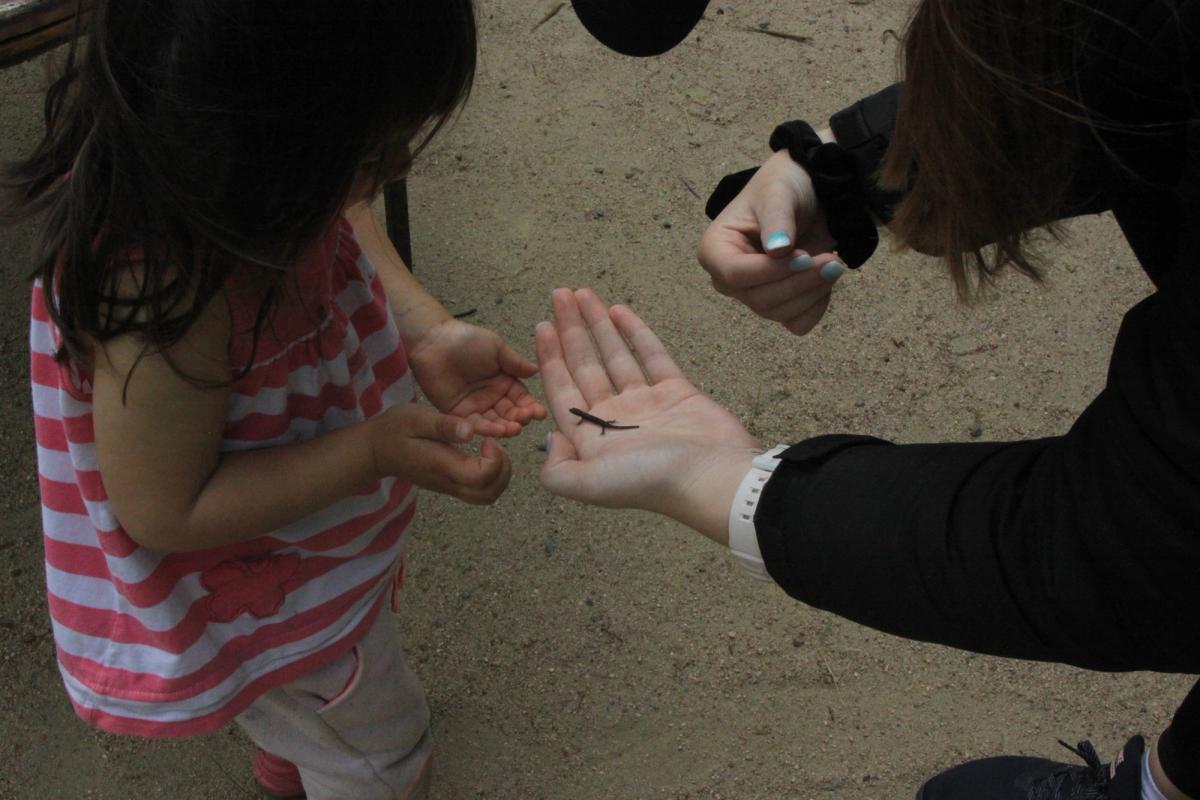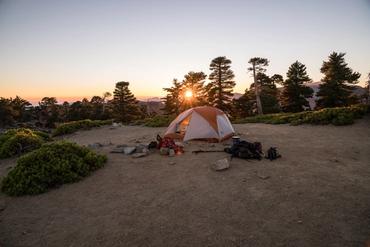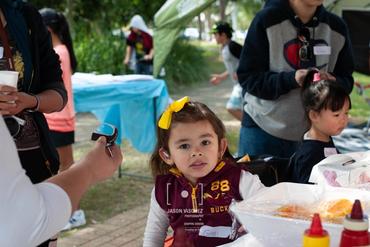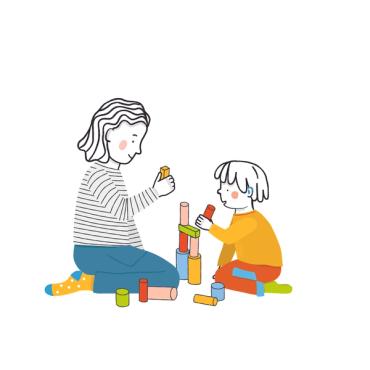My story, my career path - Melonie Harpham
Melonie is a Sign For Work Employment Consultant. Her journey with hearing loss began when she was 5 years old.

Tell us about your diagnosis as a child?
I was born hearing and due to a certain genetic combination of both my parents, I became hard of hearing when I was five. As my hearing loss is progressive, within the last five years I have now become profoundly deaf. I was told by medical professionals at the Royal Children’s hospital that as my body goes through hormonal changes such as going through puberty and menopause, I will continue to lose more hearing.
If and what age were you fitted with a hearing aid or cochlear implant and what was that like?
I was five when I had my first hearing aid. It was intensely uncomfortable and unhelpful with my type of hearing loss back then. The hearing aid would heighten all high pitch sounds in the classroom such things being dropping, chairs scraping on the floor, and general classroom noise. My hearing aids would constantly whistle which annoyed classmates and one of my teachers would constantly move me around the classroom away from others who had complained rather than trying to fix the problem. It was awful.
I wouldn’t wear my hearing aids at home. I stopped using them in primary school for a few years, then resumed using one in my right ear throughout high school. I stopped wearing hearing aids when I was studying at TAFE as I didn’t find them helpful and didn’t want to be singled out as different. I resumed wearing one in my right ear when I went to university in my early thirties and technology then was much better with noise cancellation and focusing on speech. I couldn’t wear them in the classroom when I was teaching as again, the hearing aid was not suitable for that environment and the noise cancellation also cancelled out other sounds in the classroom that I needed to hear and made me feel disoriented. I didn’t wear hearing aids again until NDIS came into effect and three years ago at 44 years of age I found really great hearing aids for both my ears and matches my hearing loss. It’s been life changing for me. Sounds I hadn’t heard in years, such as birds singing and motor bikes coming around the corner was just amazing. Plus, it has made lipreading so much easier and less exhausting trying to understand others.
Are you oral and if so, what was your experience like learning spoken language?
As I was born hearing, I developed spoken language in a normal range up until I started to lose my hearing when I was five. I then went to speech therapy to continue to develop my language skills and fill in the missing gaps – beginning and end sounds and letters that sound the same, as well as learning how to lipread. My mum also created word games at home to help myself and my brother who was born deaf. I remember going to Tarayle, oral language centre in Blackburn when I was in my early primary school years with other hard of hearing and deaf children.
However, I was very shy as a child and going into my late teenage years about speaking in public or to people I had just met, worried that my deaf accent would give me away as being different and I wouldn’t make friends. I became more confident with my voice and speaking when I started working in hospitality in year 12 on the weekends.
Do you use Auslan, why did you decide to learn and at what age?
I started to learn Auslan when I began working at Sign For Work just over four years ago, so I could communicate with my signing clients. I am not yet proficient, as my context is mainly associated with my role and work environments. But I am committed to becoming fluent as I love it and it has become a part of me and my self-expression.
How did you communicate within your family and amongst friends?
Combination of lip reading, hearing and ensuring they face me when they talk. My family and friends were supportive of my communication needs.
Tell us about going to school - what was that like? What were the worries you had that you remember?
In primary school I would miss quite a bit of what was going on in the classroom as I really wanted to fit in and was in denial about my hearing loss. I also disliked the clunky audio transmitter that the teacher had to wear that was connected to my hearing aid and connected to a big, uncomfortable audio receiver box that I wore around my neck with a cord that attached to my hearing aid. I remember hating it as a child and refusing to wear it.
I was a highly intuitive, sensitive and intelligent child and had learnt to read much earlier than the rest of the class, so I was held back by teachers who didn’t believe I could read already. This was due to my mum’s word games she had created and the reading she did with us every night. I would get bored in the classroom and cause trouble. My teacher’s would often ask my visiting teacher – a teacher would come a few times a week to help fill in the missing blanks – to take me out of the classroom. I hated that as it heightened even more my fear of being different and not accepted. This actually made me become a rebel and distrust people in authority.
High school was a very different experience and I did well there as I went to a technical school which they don’t have any more. This was a school that focused on training students for vocations in trade. It worked well for me, balancing out having to listen and concentrate for long periods of time to using my hands which I really enjoyed with subjects like woodwork, sheet metal and plastics and home economics. I also started swimming competitively in year 7 right through to year 11 at national level and the training and community outside of school developed my confidence and resilience, that had nothing to do with having a hearing loss. It was a small school I went to and I had a group of friends throughout high school that was also a support and feeling of belonging. I continued to have a visiting teacher occasionally but this was rarely required as the teachers were of much higher standard. I also went to camps for students of visiting teachers yearly in secondary school which I really loved, with other hard of hearing kids. I learnt how to horse ride and became a leader on the camp in the last couple of years. I was also asked to come back after I finished high school as a mentor/leader which was also a confidence booster.
And tell us about going to Uni or TAFE - what was that like?
I completed my Diploma in Hospitality Supervision after I finished secondary school. This was a great experience for me. I made new friends who were very accepting of my hearing loss, and I developed skills and abilities I didn’t know I had, such as creativity, problem solving, planning and facilitating events, business development, along with developing a high level of communication skills required for this industry. The classes were fairly small so I was able to follow along ok and my friends also assisted with anything I missed. The issue for me was working in the industry itself as my hearing fluctuates when I am tired, stressed or hormonal and this would make me miss information in a work environment that was highly stressful.
What influenced your career choices?
I always wanted to make a difference in the world and live a meaningful life. As I grew in confidence in my skills and abilities, along with what work I enjoyed doing and what matched my personality along with my strengths and limitations, I would move in the direction that took me. A lot of my work and study choices were like personal development that led me from strength to strength. However, it wasn’t until I was thirty and got fired from two jobs I couldn’t do because of my hearing loss that I realised how I needed to not work in areas with such a high level of customer service required and phone work. I started out in hospitality, then went into retail, selling, human resources, primary teaching, youth work, animal activism then to my own business and to what I do now. All of these roles have led me to doing what I do now and I have brought all of those skills into this role. It’s quite amazing.
What are your main challenges?
I still find it challenging what I can’t hear, particularly as I have become profoundly deaf in the last five years. It takes a lot of consistent self-awareness, advocating for my communication needs and just letting go that it is out of my control in some situations, but I can still enjoy the experience of participating. I also have only really started to embrace my deafness in the last couple of years and exploring my deaf identity and what that means for me in the big picture of who I am.
How have you learned to manage those challenges?
The challenges I have in my life will always be there, I just get better at handling them as I get older. I have more skills and confidence in myself, my ability to self-advocate, to live my life on my terms and reach out for support when I need it. I am also better at asking for support as well. Both personally and professionally. NDIS has also been life changing in terms of providing the support I need that I couldn’t afford without decreasing my quality of life as well.



